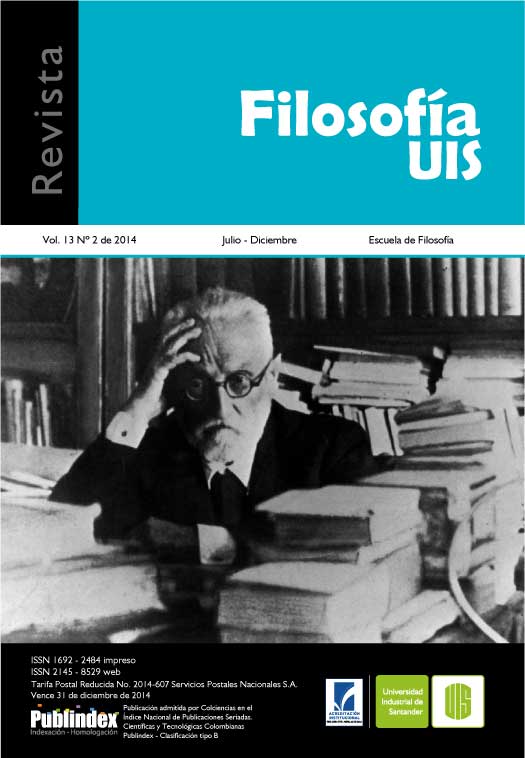Published 2014-11-04
Keywords
- desire,
- conflict,
- polis,
- psyche,
- unconscious
- freedom ...More
How to Cite
Copyright (c) 2015 Laura Suárez González de Araujo

This work is licensed under a Creative Commons Attribution 4.0 International License.
Abstract
This article will review a series of figures that we have termed “political invariants”, with which we attempt to contribute to the problematization of a construction herein, of their relevance to ‘the political’. These figures, EROS (desire) and ERIS (discord), will be tangentially applied to two closely related spheres: the public space of the city (polis) and the intimate space of the soul (psyche), and shall also be examined from the perspective of a double polarity: memory (the indelible trace of conflict) and the conquest of the unconscious as a condition of any and all possibility of freedom (stimulated by the force of desire). As such, our investigation shall take up a retrospective as well as a prospective, or forward-looking, movement bringing together in that instance the terrain of ‘the political’ with the terrain of the psychic, and from there, ‘what remains’ and ‘what can’ be in the configuration of the links between these figures and the community.
Downloads
References
- Deleuze, G. (2005). Philosophie Pratique. Paris : Les Éditions de Minuit.
- Foucault, M. (1984). Histoire de la sexualité II: L´usage des plaisirs. Paris : Gallimard.
- Freud, S. (2006a). Lo inconsciente, O.C. Tomo III. Barcelona: RBA Biblioteca de Psicoanálisis.
- Freud, S. (2006b). Las pulsiones y sus destinos, en O.C. Tomo III. Barcelona: RBA Biblioteca de Psicoanálisis.
- Freud, S. (1979). Malestar en la Cultura, en O.C. Tomo XXI. Buenos Aires: Amorrortu.
- Loraux, N. (2005). La Cité Divisée. Paris: Payot.
- Martínez Marzoa, F. (1995). Historia de la filosofía antigua. Madrid: Akal.
- Nietzsche, F. (1995). Genealogía de la Moral. Madrid: Alianza Editorial.
- Rancière, J. (1996). El desacuerdo. Buenos Aires: Nueva Visión.
- Spinoza, B. (2004). Ética demostrada según el orden geométrico. Madrid: Alianza Editorial.
- Spinoza, B. (1997). Tratado teológico-político. Barcelona: Altaya.
- CIBERGRAFÍA
- Deleuze, G: (1978). Curso sobre Spinoza. Vincennes 24/01/1978. Recuperado de: http://www.webdeleuze.com/php/texte.php?cle=12&groupe=Spinoza&lang ue=3
